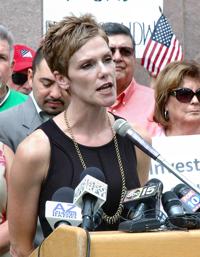PHOENIX — Voters will not get a chance this year to strengthen public financing of elections and curb the influence of private dollars.
Julie Erfle, spokeswoman for Arizonans for Clean and Accountable Elections, said late Wednesday that organizers have been able to gather only slightly more than 100,000 signatures in their bid to put the issue on the November ballot. She said there is no way to get the more than 150,000 valid signatures by the July 7 deadline.
But Erfle insisted that’s not because Arizonans are opposed to the measure.
She said the organization was set to sign a contract with an Arizona firm to circulate petitions when another group with links to the business community hired the same firm for a different ballot measure, one backed by business interests. Erfle said that contract had a noncompete clause that left her group without anyone to go out and get signatures.
Erfle said by the time organizers found an out-of-state firm to do the work too much time had been lost.
She blamed the Arizona Chamber of Commerce and Industry. And Garrick Taylor, its spokesman, did not deny working to thwart the measure.
“The board of directors of the chamber has made it clear that they want to consider all possible means to ensuring that what is essentially taxpayer funded elections on steroids did not become the law in Arizona,” he said.
Taylor said that includes using “all options available to us” to block the measure. And he did not deny those options included noncompete contracts for petition circulators.
But voters still may have a chance to weigh in on the issue of money and how it influences elections.
A separate group is gathering signatures to force a public vote on a legislatively approved measure that would reduce state regulation of some groups that try to influence elections but refuse to disclose their donors. That drive needs only half as many signatures before Aug. 5.
Arizonans approved the Citizens Clean Elections Act in 1998. It allows candidates for statewide and legislative office to get public dollars for their campaigns if they do not take private funds.
Since that time, however, a variety of legislative changes has made running with public dollars less attractive.
This measure would have rolled back those limits and provided more dollars for publicly financed contenders. It also would have forced greater disclosure of “dark money” anonymous donations and required lawmakers to make public all the gifts, meals and travel received.
Taylor said his organization and others oppose public financing, saying candidates should be required to go to individuals and groups and make their case for financial backing. And he said there is no reason that some groups that seek to influence elections should have to disclose the names of their members.
Erfle said business groups are entitled to that position. But what she said they should not be able to do is undermine a legal petition drive, denying voters a chance to make their own decision in November whether to change the law.
“Perhaps what they did was legally OK, was within the bounds of the law,” she said.




